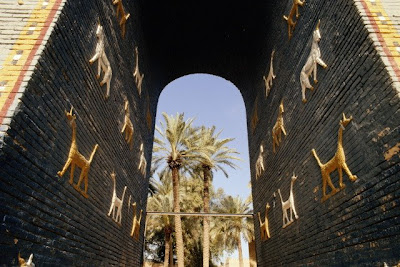Maqam Rast - Hajj ʻAbbas al-Sheikhli
Hajj ʻAbbas Kambir al-Sheikhli (1883-1971)
Baghdad, Iraq. 78rpm recording.
c. 1928
مقام الرست من اداء القارئ الحاج عباس محمد (ابن كمبير) الشيخلي (١٨٨٣-١٩٧١) مع التخت الشرقي وعازف الجوزه ناحوم يونا درزي. تسجيل اسطوانه قديم من عشرينات القرن الماضي. القصيده بالفارسيه للشاعر حافظ الشيرازي (القرن الرابع عشر
The Maqam Rast is a primary maqam based on the rast mode. It is sung to classical Arabic verses (formerly Persian or Turkish) without rhythmic accompaniment except for two brief rhythmic interludes between the second and third meyanas. It typically includes the modulating pieces: Negriz, Mansuri, Ibrahimi, Hijaz Shaytani, Segah Balaban, Khalili, Sharqi Rast, Hijaz Madani, and Mathnawi. The poem sung here is in classical Persian and is attributed to Hafez Shirazi (14th century): "Tu bareh khatirah hudan" (You carry the weight of my thoughts).
- Tahrir, unmeasured vocal introduction, presenting the rast mode to the word "yar" (love, Turkish and Persian).
- Instrumental piece on the qanun in rast mode representing the melody of the tahrir. (0:35)
- A verse in rast mode ending with a modulation on the 'arabat hijaz degree called Negriz. (0:47)
- Music changes to mansuri mode. (1:16)
- A piece called Mansuri (saba on G), consisting of a verse in mansuri mode preceded by the interjection "Ay", followed by a return to rast. (1:20)
- Jalsa, cadenza characterized by a gradual descent to the tonic sung to the word "yar" in rast mode, ending the first part of the maqam. (1:55)
Second part:
- First meyana called Balaban (in rast mode) sung in high register to the words "ya dost" (Arabic-Persian, my friend) followed by a verse in the same mode and a return to the tonic. (2:27)
- Dulab in sharqi rast mode and a 4/4 wahda rhythm. (3:30)
- Second meyana called Khalili (chahargah mode) to the words "nazenine men" (Persian, my honey) followed by a fragment of a verse in the same mode. (4:07)
- A piece called Sharqi Rast (in sharqi rast mode) sung to the words "ya lali, ya lali, ya ya ya dayim" (Iraqi-Arabic, oh eternal one). (4:32)
- Instrumental piece on the qanun in sharqi rast mode. (4:50)
- Third meyana called Madani (hijaz mode) to the words "yademen". (5:00)
- A piece called Mathnawi (hijaz mode) consisting of a sung verse followed by the command "aziz men" and a return to rast with a brief modulation in negriz mode. (5:27)
- Taslim, conclusion of the maqam in rast mode, sung to the words "ya lail, yar", gradually descending to the tonic by way of the Negriz. (6:38)
Joza: Nahum Yonah Ben-Yonah Darzi (1878-1955)
Qanun: (?)
Tabla: (?)
*
Hajj ʻAbbas Muhammed Ali Abdul Karim al-Shaykhli (nicknamed Ibn Kimbir) was born in the Bab al-Shaykh district of old Baghdad in 1883, in an environment that was rife with colorful maqam performances at cafes, mosques and private parties. He learned the maqam al-ʻIraqi at the hands of Khattab Omar and the great Ahmed Zaydan, and he recorded several maqams for local and foreign companies. Al-Shaykhli was widely renowned in Iraq for his powerful voice and his performance of the Bayat and Taher maqams. He died in 1971.
الحاج عباس الشيخلي بن محمد علي بن عبد الكريم و كنيته (ابن كٍمبير): من رواد المدرسه الزيدانية للمقام العراقي. ولد في محله باب الشيخ في بغداد سنة ١٨٨٣ و اخذ المقام مبدئيا من خطاب عمر و اتقنه و اتمه على يد احمد زيدان. قرأ عشرة مقامات في الاسطوانات و هي الحسيني، البيات، الطاهر، الناري، المحمودي، السيكَاه، الرست، المنصوري، الخنبات و النوى. و هو من المغنين الجيدين المعروفين بالضبط و القوة. لم يسمع من يجيد تحارير المقامات مثله لا سيما تحرير مقام الطاهر. و البيات الذي قرأه في الأسطوانة يضرب به المثل بين المغنين. اخذ منه احمد الملا رحيم الشيخلي و آخرون. توفي سنة ١٩٧١. (الشيخ جلال الحنفي - المقام العراقي)






Comments
Post a Comment